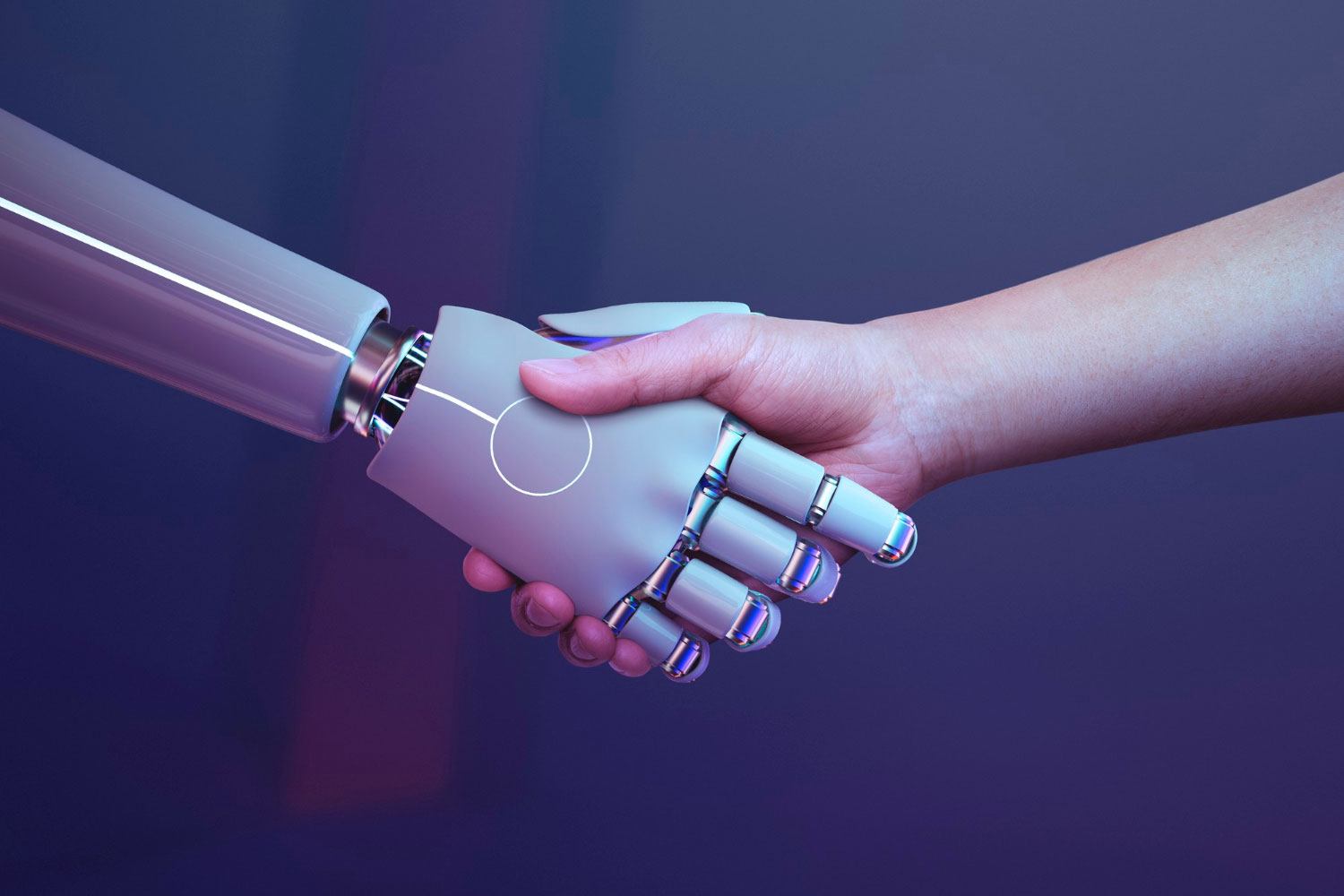Are you familiar with the role of Artificial Intelligence and Machine Learning? If not then this blog will be very helpful for you.
What is software for artificial intelligence? Artificial intelligence is nothing but a simulation of human intelligence by machines. It encompasses the aptitudes for perception, generalization, and reasoning. An artificial intelligence (AI) machine can sense its surroundings and act as it does.
AI software refers to any computer program that imitates human behaviour by learning numerous data patterns and insights—machine learning, speech and voice recognition, virtual assistants, and other critical characteristics of AI software.
Since its creation, AI has revolutionized the software development industry. Nowadays, coding is where artificial intelligence first enters the software development process. Up to deployment, it has aided software development at every level.
AI is also enhancing software development by assisting in creating new technological paradigms. Thanks to AI and algorithm-based machine learning, we have expedited the software development lifecycle without experiencing any hiccups at any point during development.
We can quickly increase productivity, quality, and speed in the software sector by developing AI software, a disruptive improvement in that field. Recent studies show that software development has accelerated ten times due to AI advancement.
AI algorithms can boost user experience, project planning, and automation QA (quality assurance). The applications of artificial intelligence in software development are listed below. Hence let’s read about the role of artificial intelligence and machine learning in the following article.
What is Artificial intelligence (AI)?
The synthetic machine is working that practice acting and thinking like a human is what is known as Artificial intelligence (AI). Artificial intelligence is a subset of Data Science responsible for bringing life to a machine. Do not underestimate the potential of AI.
Also, ever since AI reached the satellite orbit, which SpaceX launched, we can say there’s no limit to AI. Every industry area and field uses AI more and more as it advances. Data scientists’ predictive analysis of data is based on algorithm-based machine learning, which is further a subset of artificial intelligence.
Mostly, humans, we machine or mainly AI for our tasks, which has also become out day to day lifestyle. The most recent developments in artificial intelligence (AI) in the field of neural networks gave rise to a new branch of machine learning known as deep learning.
AI is the future of self-driving automobiles and what not in today’s era of digitalization. Artificial intelligence’s significance is acknowledged in the field of developing software. It also speeds up every action and automates the workflow at every level, creating an excellent user experience.
Role of artificial intelligence and machine learning in the Development of Software
We may anticipate a better app being built in the current environment due to AI’s influence on developing applications. Our understanding of AI will shape the future of software development, as most firms today are expressing interest in AI.
80% of businesses are wisely utilizing AI. Nearly 47% of companies with advanced digital infrastructure have an AI strategy. By 2021, it is expected that just AI tools will generate $2.9 trillion in commercial value.
You should comprehend the role of Artificial Intelligence and Machine Learning in software development and assess the changes if you wish to implement this method. These are the features that AI can include in software development to give your customers highly customized goods or services.
1. Higher user experience
Every piece of software must have a forum where users can ask questions and receive answers. Instead of just being a platform, an AI-powered platform (AI Chatbots) provides users with an exceptional user experience by promptly responding to their queries.
We all are aware as almost everything is automated these days. Even customer care websites are handled by AI chatbots. And we use multiple known examples of it daily—applications like Zomato, IRCTC, BookMyShow, Etc., where chatbots reply to their customers.
Also, Alexa is a voice assistant powered by AI, and other intelligent voice assistants have been assisting consumers with various tasks at their fingertips.
2. An accelerated rate of development
DevOp can streamline numerous software testing processes with machine learning and deep learning techniques. AI will automatically test the program at every level, eliminating the need for quality assurance analysts to try it manually.
Also, sectors like trading bots are now powered by AI., which is also highly used by fintech organizations to automate their books’ deals.
3. Improved Privacy and Security
The more potent machine learning models can classify and identify almost everything in a single frame. As a result, AI can improve security by limiting access to just those recognized and confirmed while respecting user privacy by granting varying access to various users as determined by the admin. AI is the only technology used by banking applications to safeguard client data.
4. Deletion of errors
The AI can diagnose and fix errors without requiring human participation, lowering maintenance expenses. With the idea of reward and punishment, reinforcement learning can be used by AI to handle faults. The data is then retrained to prevent future instances of the mistakes. Once an error is fixed, it can permanently be erased.
5. Time estimation and decision-making
As said before, there is no limit to AI and its abilities. The machine may choose the best course of action under specified limitations and criteria. When trained with prior project deadlines and cost estimates is essential.
Various regression models can assist in predicting the projected time frame and cost estimation for the current project. The supervised and unsupervised learning algorithms may benefit a developer with better services.
AI has numerous uses in software development, including automated coding, automated UI design, Etc. This is the rationale for the assumption that 80% of companies are investing in AI and that 50% have already begun formulating their AI plans.
You might have also heard that AI plays its part in software creation. Additionally, it assists in the most cost-effective deployment of the program’s developers. Users’ interests and wants can be ascertained through surveys.
Machine learning algorithms can then process the data to determine the optimal region and time for a product’s deployment. After a deployment, AI can be applied to sentiment analysis to comprehend user input and assist developers in implementing new upgrades.
This will satisfy users. Natural language processing can be used to perform sentimental analysis, which aids in determining the extent of improvements from each piece of user feedback.
6. Increasing Development Scale and Speed
One of the main areas that have benefited from AI is DevOps, a set of practises that integrate software development and IT operations to shorten the systems development life cycle and enable continuous delivery with high software.
You may quickly determine how AI has impacted the accelerated pace and scope of development by looking at key performance measures like deployment frequency, lead time for modifications, and time to restore service.
AI can execute tests automatically without manual intervention from quality assurance analysts, while machine learning speeds up processes like software testing. Additionally, testing more situations can also save time.
AI-based quality assurance will be error-free as well. AI is excellent and accurate with all the testing. This helps to lower the failure rates, which enhances the development process.
7. Increasing Developer Productivity
AI has aided developers in doing more work. The rest of the process can be automated by giving it to an AI machine once the engineers have created the framework for the code and finished creating its skeleton.
They can now focus on other jobs that an AI cannot do. Here, developers handle complex tasks, while an AI might handle tiresome, repetitive tasks. However, it should be remembered that no matter how far AI advances.
Hence AI will never be able to create an entire piece of software from scratch. Developers can use AI to write better code. However, I cannot take the software developer role since, without a human mind; the code would be aimless.
8. Making Strategic Decisions
Analytics are the driving force behind decision-making in software development. AI can swiftly complete the task without making a mistake. With the least risk if it is trained to evaluate a software’s performance based on the success and failure of its previous version.
AI can speed up decision-making by cutting down on time spent manually deciding which features and products have the best chance of being successful. AI will have vast data as computer power and data storage rise.
This will enable it to assist us in making wise judgments. It will also aid in removing all biases and mistakes made by people.
9. Error Control and Management
One of the leading causes of downtime in software development is error handling. This case is especially true if you use a cloud-based platform or software as a service. A developer must manually fix any discovered error.
With clients utilizing your business around the clock, any second of downtime in the software will cost you money and a reputation. All you need to do with AI is offer historical data and software analyses. This data can be learned, and it can spot typical mistakes.
If these take place during development, AI will quickly highlight them and facilitate corrections. In the post-development phase, AI often examines system logs and highlights faults and anomalies.
Accurate Estimate of the time it will take to develop software is difficult to estimate. Because of this, software engineers find it challenging to provide exact timetables and cost estimates for AI software design.
In such circumstances, you can develop an AI software design that, using historical data, can offer precise estimations of the time, effort, and budget required. AI can examine all the data and assist you in making estimates.
Using this information, you can choose which projects to accept and which to reject. Establishing a positive client-business connection is simpler when you can set reasonable timelines.
10. Instantaneous feedback
AI advancements have enabled training machine learning algorithms to scan any platform for user interaction patterns. As a result, developers may receive real-time input. Developers’ downtime can be reduced with the help of this ongoing input.
It also helps you determine what to work on and what interests customers. You may ensure your customers have a better experience by working in places where customers do not spend much time.
For the creation of software, AI has already proven to be invaluable. Any software, whether for business or otherwise, can advance development. It might be the automation of any system your company uses, a chatbot, or an AI decision support system.
Artificial intelligence makes all of our lives easier. We were implementing AI into our system to better understand the aims to know clients and their expectations. This does not aid in making the developer’s or creators’ jobs much more manageable.
How Artificial Intelligence and Machine Learning are Revolutionizing the Software Development Industry
So far, you have read about artificial intelligence and machine learning, including the role of artificial intelligence and machine learning. This section includes ways in which artificial intelligence (AI) and machine learning (ML) are revolutionizing software development.
-
Automated Software Testing using AI
Software testing for apps can be automated with the aid of artificial intelligence. Artificial Intelligence can play a variety of roles in automated software testing. It includes:
- To create test scenarios that will find bugs more frequently
- To locate and produce test data for functional test use
Even automated exploratory testing can be carried out using some AI algorithms. Here artificial intelligence can be applied to creative or intuitive software testing jobs. An artificial intelligence system is more likely to find problems than a human tester since it may explore an application in novel and creative ways.
However, developers of software shouldn’t take the place of human testers with AI. Artificial intelligence can still not entirely do some tasks, such as comprehending user interfaces and recognizing emotions. Artificial intelligence should therefore be viewed as a technology that can assist in automating software testing and enhancing its precision.
2. Code Compilers Controlled by AI
Compiling code can be made much easier by the artificial intelligence employed in software development used in code compilers. It accomplishes this by examining the source code and picking the appropriate compiler for each file it discovers in your project.
Hence it saves time that could have been wasted in finding problems in the codes. They will be recognized by artificial intelligence for you.
An artificial intelligence called a code compiler can exist as either software or hardware. They translate source code into machine-readable object files and libraries, which form an executable programme when coupled with other object files.
3. Programming Assistants Using AI
Using AI-based programming assistants is one of the most visible ways AI influences software development. These helpers are intended to assist programmers with various tasks, including code completion, error checking, and documentation search. They frequently even offer suggestions for fixing your problems.
The development process can be significantly accelerated by using AI-based programming assistance. They can speed up finding and fixing faults while enabling you to complete more work in less time.
4. Autonomous DevOps
Automated DevOps is the second significant method of AI in software development that impacts the sector. The process of automating the software development lifecycle is referred to as DevOps.
Automating these procedures may quicken the development process and lower the number of deployment failures. Several AI-based tools, like IBM Watson and Microsoft Azure Machine Learning Studio, can be utilized.
These programs can keep track of your software development process and spot any issues before they arise. They can also automate the deployment procedure, guaranteeing that your software is always current.
5. Making Strategic Decisions with AI
The capacity of AI to support strategic decision-making in software development is one of its most important uses. AI helps predict the patterns and trends included in data which could be challenging. This enables developers to choose better options for feature priority, target markets, and product design.
To create prediction models, artificial intelligence is majorly utilized. Based on historical data, these models can forecast future results. The decisions taken in this way can affect the company’s financial success and long-term strategy.
6. Calculating costs and making considering plans
There are multiple benefits of AI technology. This includes AI technology in software development, whose ability helps with cost estimation. AI also helps with precise planning and management making plans. Compared to traditional software development, the estimated time and money required to complete a project is much more difficult.
This is due to a large number of unknowable factors at play. But because of the power of AI and machine learning, the prior is no longer an issue. With AI and machine learning technology, developers can quickly determine how much time and money will be required to complete a project successfully.
7. Enhanced comprehension of user behaviour
AI and machine learning do significantly impact human behaviour. It will be much easier for developers to create applications by knowing how users interact with software. They can also spot and address future issues before they get out of hand.
Impact of AI on Software Development
The development of software is significantly impacted by artificial intelligence (AI). The following are some ways AI is influencing software development:
Acquiring requirements
Due to its conceptual nature, the necessity collecting phase of The Software Development Life Cycle calls for the most human interaction. It is feasible to automate some processes and, to some extent, lessen the need for human input with machine learning, a range of techniques, and tools, like Google ML Kit and Infosys Nia.
This stage places much attention on finding gaps before going on to design. Natural language processing is an AI method that enables machines to comprehend user needs expressed in natural language and automatically generate advanced software models.
Of course, this strategy has significant drawbacks, which include difficulty balancing the created systems. It is still one of the favourite research subjects of today, nevertheless.
Program Design
Planning and developing projects requires specialized knowledge and experience to suggest a concrete answer. Often designers face difficulties while opting for the right design for each step without making mistakes.
A retract and forward-looking exploration plan enables continuous design revisions until the client discovers the perfect solution. The most efficient techniques for project design might be made possible by using AI tools to automate some complex tasks.
For instance, designers can use AIDA (Artificial Intelligence Design Assistant) to comprehend the client’s demands and want and then use that information to design the ideal project. AIDA serves as a website-building platform that examines a variety of software design settings and presents the best-customized design based on the client’s needs.
Generate Code Automatically
Taking a business idea and writing code for such a large enterprise takes much time and labour. Experts have developed a system that writes code before setting to address the time and cost issues.
Since obtaining these details takes far longer than writing code from the start, the method does not function well with uncertainties such as what the objective of the code is supposed to do. The workload will be lessened with AI-assisted intelligence programming.
Automatic Code Generation
Translating a business concept into code for such a massive corporation requires much time and effort. Experts have developed a system that produces code before beginning work to solve the concerns with time and expense.
However, because obtaining these details takes far longer than writing code, the method does not function well with unknowns like what the target code is supposed to do. With AI-assisted intelligence programming, the burden will be slightly reduced.
Benefits of AI in Software Development
By being aware of AI consequences and the possibility for future advancement in software development, one should also know the effects of adopting AI technology. There are multiple positive effects of artificial intelligence’s influence on software development.
We are listing some of those benefits under this section:
- Finding bugs and errors is made simpler: With the help of AI, coders now do not need to work hard to debug their codes. Coding by combining AI tools has enhanced over time. Developers and testers don’t need to debug executable files full of mistakes. Hence AI is better for identifying and fixing bugs quickly. Developers have a team that helps them leverage machine learning tools to predict their work in the right direction.
- Make more wise decisions to create superior software: It is now possible for machine learning systems to analyze the performance of ongoing initiatives as well as learn from the mistakes made in earlier development projects. AI in software development not only facilitates development but also produces apps with higher quality.
- Increased estimation accuracy: AI provides a method for estimating software that entails looking for connections and statistics in historical data from the company’s prior initiatives. It uses corporate regulations or statistical analysis to predict cost, time, and effort accurately. Using machine learning and computer vision processing helps developers in this case
Future Of Artificial Intelligence And Machine Learning In Software Development
- Increased automation: Machine learning and AI will keep automating more software development processes, freeing engineers to concentrate on more challenging jobs and allowing them to produce software more quickly and excellently.
- More intelligent software: AI and ML algorithms will advance, allowing software better to comprehend human behaviour, preferences, and intents. The software will become more individualized and user-friendly as a result.
- Greater integration: artificial intelligence and machine learning will be more firmly included in platforms for creating software, making it more straightforward for developers to implement these technologies into their applications.
- Natural language processing improvements: As this computer science field develops, we anticipate seeing more software that can comprehend and interpret human language.
- Development of explainable AI: AI systems that can explain their decision-making processes to humans are called explainable AI. Explainable AI will become more crucial as the significance of ethical issues in AI increases.
- Increasing the usage of machine learning models in software development: Machine learning models are increasingly used in software development. To aid developers in making wiser choices during the development process, we can anticipate the emergence of increasingly advanced models.
AI and ML will generally transform software development, making it more rapid, effective, and individualized. We may anticipate even more innovation and fascinating breakthroughs as these technologies develop.
Conclusion
AI has the potential to enhance user experience and operational performance. You have read the article about the multiple role of artificial intelligence and machine learning. Then you might have learned how AI makes life easy on daily biases.
You can program your AI to suggest individualized and unique content to the user. AI acts as a sophisticated algorithm. Which also serves as next-generation security and data privacy with guaranteed encryption.
With these technical developments, the future of the human race appears bright. We should all hope that the changes brought forth by AI will be to the advantage of society and people in general. Once the ultimate strength of artificial intelligence is merged with coming human advancements, there would be nothing that a human would need to do manually.









